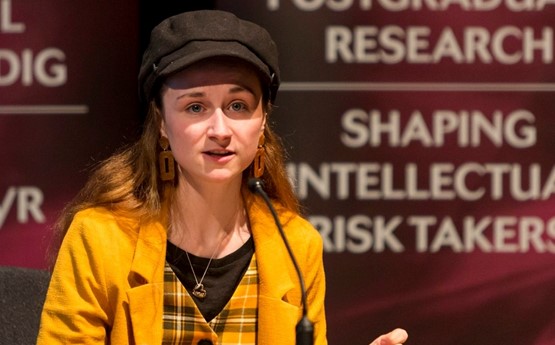How did you get involved?
I attended an event held by the PGR team in which the Brilliant Club was mentioned. I didn't apply straight away, but I did eventually, as it was something that came up in conversation with other PGRs and I liked the idea of taking my research to a wider audience. It also allowed me to develop teaching skills and was part of my application for my AFHEA and also informed my work in the university as a Senior Teaching Assistant and Peer Writing Advisor.
What have you done as part of your work with the Brilliant Club?
I have taught in a variety of schools using the handbook that I created, which uses my research to form a lesson plan across five weeks alongside a final assignment. I've also been able to run courses in a variety of other subjects, which has helped me develop a range of transferable skills as I'm able to adapt each course to the school and the students.
What does a typical day of Brilliant Club work look like?
This can vary depending on whether I teach online or face-to-face classes. If it is online, I will usually set up early to resolve any tech issues before the class. I'll also have adapted the class from a face-to-face format to an online format to ensure it is fully accessible and the various tasks set are achievable. I also have a cup of tea ready and ensure I'm in a suitable space for leading an online class.
If it is face-to-face, my planning varies depending on the distance. While you don't need a car to be a part of the Brilliant Club, I've found it helpful as it allows me access to schools that are further away, and I quite like the commute for catching up on podcasts. However, the majority of my schools have been in or around the Swansea area which has been handy. Usually, I will check for any messages on the hub the night before the class and on the morning of the class (as sometimes students will send homework on the morning of a session) and respond to any messages from students as needed. There is a new system with the hub that sends you an update when there is a new notification which is handy, but it is once every 24 hours, so it is always worth checking before a session.
I have a pack of different handbooks depending on the course with my notes in them alongside my DBS in case the school wants to check it, so I review that I have everything I need ahead of a session, and I will usually make a coffee to go before heading out to the school. If I've been to the school before and a student has expressed an interest in a specific subject area, I will see if there is a way to add it into the class or if there is more information they can be signposted to. I want the class to be tailored to them, so I adapt as needed based on class reaction. After the session, I will make sure that any relevant material is uploaded onto the hub and reminders about homework, core topics covered in class, and any relevant links or reading material that might be of interest.
Did creating a course based on your research make you think about your research differently and how?
I found that it was interesting to try and make my research more 'bitesize' and accessible to a younger audience; it has also allowed me to have conversations with young people who sometimes will provide different insights or perspectives on a research topic which can be useful to reflect on. Conversations from my classes have inspired me to consider creating additional handbooks based on the topics raised, and it is always great to see people be interested in your research. However, the real moment to see the impact is via the final assignment, in which you can see them using your research and undertaking their own independent research and critical analysis of the topic to create a final piece of work. It acts as a nice way to sum up the work that has been undertaken and as a comparison to their baseline assignment which lets you know how far they have come.
What would you say to a PGR who was thinking about getting involved?
It is definitely an opportunity worth doing; it can give you a wide range of teaching skills as the Brilliant Club does offer training and has tutor labs which cover a range of additional topics such as what to do after your PhD. They also have networks for students in different areas such as an Arts and Humanities network where we meet up and chat about our teaching, our research etc once per term and there is also a Facebook group for reaching out and asking questions so you aren't alone in this and there is support out there, especially if you are a little anxious about it. I also have a meeting with schools before going in to teach, so I have a familiar face and name attached to each school before I arrive and this helps you plan for the class and know what to expect. You will also have a placement coordinator who you can reach out to if you have questions or concerns.
It has helped me take my research and turn it into different formats for different audiences, provided me with teaching experience and helped me improve my writing as I've had a wealth of experience critiquing and advising my students on issues such as critical writing and essay structure.

